Are you a bit ashamed of being emotional. Do you think shedding tears or expressing love is a sign of weakness. Do you feel you do not reason properly, and are unable to make any decision because of your emotional profile. Do you think reason alone should be relied on in decision making, in relationships, in getting along in the world. You need not have such fears, for current research into the emotional domain shows that without emotions, you would neither be strong, nor intelligent, nor caring, nor would you be able to achieve anything in life. And those who think that reason alone ought to be our guide in life do not know that without emotions one cannot reason at all. You would be a cold automaton unable to experience the richness of life, unable to love, unable to hate, unable to share the finer sentiments that make us what we are.
It is rather surprising that those who have denigrated 'emotion' have done so very passionately, they have been very emotional about it, very touchy about it. The dichotomy between emotion and reason, however, is very ambiguous. The head versus the heart debate goes back to antiquity, yet nothing much seems to have been achieved. First of all people do not agree on what is 'emotion' and what is 'reason', yet they go on arguing endlessly about them. The first task, therefore, ought to be to understand the two terms, the concepts behind them, and the mechanisms behind them. Only then can there be some fruitful argument about them.
Emotions: Conceptual Issues
We use the word 'emotion' frequently, but if asked to define it, to explain it, we are at a loss. This is because though emotions are an integral part of our daily experience, they are extremely difficult to understand. Philosophers and psychologists say that emotions are mental states that were called 'appetite' by the Greeks, and 'affect' and 'passions' by other philosophers such as Rene Descartes and David Hume. The sheer range of phenomena covered by the word 'emotion' and other related terms makes it difficult to define it. The problem was summed up well by J. S. Brown and I. E. Farber in their theoretical paper on emotion. They begin by saying that no 'genuine order can be discerned within this field. Instead, examination of current treatments of emotion reveals a discouraging state of confusion and uncertainty. Substantial advances have been made in recent years with respect to theories of learning and motivation, but the phenomena of emotion have not, as a rule, been considered in these formulations and remain a tangle of unrelated facts'.[i]
Such theoretical difficulties in the study of emotions have led some theorists to deny the very existence of emotions. Predicting the redundancy of the term 'emotion', M. F. Meyer said in 1933: 'Why introduce into science an unneeded term, such as emotion, when there are already scientific terms for everything we have to describe? . . . I predict: The 'will' has virtually passed out of our scientific psychology today; the 'emotion' is bound to do the same.'[ii]
Not all go to such extremes however, but among the numerous difficulties in analysing emotions, one is due to the fact that so many systems of the body are involved in emotion. A second problem has been the tendency to separate emotion from cognition or rational thought processes. Recent studies show that the physiological and psychological processes that are responsible for the emotions are, however, interrelated.
The study of emotions remained neglected for centuries because it is believed that one the characteristic features of humans that separates them from the rest of the living creatures is the capacity to reason. It is no wonder, therefore, that thinkers have always emphasised this aspect at the expense of others.
The Problem of Terminology
The use of the word emotion in philosophy and psychology is comparatively modern. Hume wrote about it, but even he speaks generally rather of 'passions' or 'affections'. As various thinkers have used the word 'emotion' and other related terms, there has always been confusion and disagreement. A. Baier has noted, for example, that while 'emotion' used to mean 'violent passion', we now seem to use 'passion' to mean 'violent emotion'.[iii] Later, when the word 'emotion' gained currency its application was very wide.
According to the Oxford Dictionary of English Etymology, 'emotion' is an 'agitation, tumult, physical disturbance, disturbance of mind or feeling, affection of the mind. The word, the dictionary says, was rare before the second half of the 17th century. The Oxford English Dictionary (1989) tells us that the word emotion is an adaptation of Latin noun 'ēmotion-em', which means 'of action'. In psychology, the word emotion means 'a mental 'feeling' or 'affection' (e.g., of pleasure or pain desire or aversion, surprise, hope or fear, etc.), as distinguished from cognitive or volitional states of consciousness. In German the word for emotion is 'affekt', and the Italian word for it is 'emozione'. Dictionary of Philosophy and Psychology goes on to define 'emotion' as a total state of consciousness considered as involving a distinctive feeling-tone and a characteristic trend of activity, aroused by a certain situation which is either perceived or ideally represented.[iv]
Regarding other terms, let us take first take 'passion' which in Latin was chiefly a word of Christian theology, and that was also its earliest use in French and English: the suffering of pain, now usually the sufferings of Jesus Christ on the cross. Another entry in The Oxford English Dictionary on 'passion' calls it any kind of feeling by which the mind is powerfully affected or moved; a vehement, commanding, or overpowering emotion.
There are other words that are frequently used in connection with emotion, sometimes believed to be its synonyms: feelings, moods, sentiments, reflexes, instincts, and drives. It ought to be stressed here that there is a great deal of vagueness in how we use these words in our daily lives, and how they are used in philosophy and psychology. Even philosophers and psychologists often disagree about their meaning, and they use them variously.
Distinguishing between emotions and moods, Paul Ekman, a leading investigator and theorist on emotion, says that emotions typically last for a very short time, a second or even less, while moods last longer.[v] Davidson and Sternberg point out that the concept of mood refers to the feeling state when the object or cause is not in the focus of attention. In fact, people are often unaware of the causes of their moods, which may include minor events such as finding or losing some amount of money, as well as background variables such as a lack of daylight or exercise. Hence, moods lack a specific referent and usually come about gradually, are of low intensity, and may endure for some time. These differences are apparent in ordinary language when we say that we are afraid 'of' or angry 'about' something, but we are 'in' a good mood. As a result, emotions draw our attention to the eliciting event and are likely to interrupt other ongoing activity. Moods, on the other hand, remain in the background, and it is this diffuse and unfocussed quality that accounts for their pervasive influence.[vi]
Now we can take up the word 'sentiment' which in everyday use refers to conscious feelings. Shand and McDougall define 'sentiment' as complex dispositions acquired through individual experience, which underlie feelings and ideas. As for 'feelings', the notion of an 'inner sense' which perceives the perceiver's emotions is lent plausibility by the use of the verb 'to feel' in reports both of emotional states and of perceptions.
'Impulse' means a sudden wish or urge to do something. 'Reflex' is a simple pattern of response that is determined by a characteristic pattern of stimulation and by a preorganised bodily structure. 'Instinct' differs from 'reflex' as instinctive patterns are more complex and more persistent. Instinctive behaviour is more plastic, variable, adaptable to environmental conditions than reflexes. Instinctive acts are commonly determined by hormones, but a sustained chemical excitant is not characteristic of reflex actions, according to Paul Thomas Young.[vii]
The words 'instincts' and 'drives', however, have generated heated debate among thinkers, because to some they suggest some kind of biological determinism. This created problems for Darwin when he suggested that certain behaviours are innate and passed on, and Freud who suggested the idea of 'Eros' and 'Thanatos', the love and death instincts. But such objections are unjustified, for though human beings could be said to posses a free will, we are also biological beings, and most biological features are given to us by nature. Certain behaviour of most organisms is innate, and the organism will be predisposed to behave that way even if it grows in total isolation. Without some basic innate programme, most organisms would not be urged to do anything. William James put it aptly: 'Now why do the various animals do what seem to us such strange things, in the presence of such outlandish stimuli? Why does the hen, for example, submit herself to the tedium of incubating such a fearfully uninteresting set of objects as a nestful of eggs, unless she have some sort of a prophetic inkling of the result?'[viii] We might as well mention 'tropism' here, a term biologists use to designate a persistent orientation of the organism to a field of force, such as a moth, for instance, maintains a fixed orientation towards the candle flame.
Distinction must also be made between emotion state and trait. An emotion state, suggests Richard Lazarus, usually refers to a transient reaction to specific kinds of adaptational encounters. We say that someone is displaying or experiencing anger at a particular time and place; the state comes and goes with the circumstances. An emotion trait, on the other hand, usually refers to a disposition or tendency to react in a particular emotional way to an adaptational encounter. To speak of trait implies frequent recurrence of the state in diverse but specifiable circumstances.[ix]
Another word that we often use in everyday language is 'temperament'. A temperamental quality usually refers to an inherited profile of behaviour that predisposes a person to experience a particular affective reaction, given a relevant incentive. Like a mood, a temperamental quality is an individual difference construct. But, unlike mood, which does not imply a genetic pedigree, a temperamental quality does imply some genetic influence. Jerome Kagan clarifies this with an example: The state of fatigue provides an appropriate analogy. The fatigue produced by a poor night's sleep is an acute feeling state. A mood of chronic fatigue can be due to responsibility for caring for triplets for the first five years of their lives. Finally, the fatigue of a person who inherited a mild hypothyroidism is analogous to a temperamental quality.[x]
Certain instincts or drives are decidedly hardwired, but it does not mean that we are total slaves to them. As Steven Pinker explains, 'Saying that the different ways of knowing are innate is different from saying that knowledge is innate. Obviously, we have to learn about Frisbees, butterflies, and lawyers. Talking about innate modules is not meant to minimize learning but to explain it.' [xi]
[i] J. S. Brown and I. E. Farber, 'Emotions Conceptualized as Intervening Variables', Psychological Bullettin, 1951, pp. 465-95, quoted by James Hillman, Emotion, Routledge & Kegan Paul 1960, pp 6
[ii]M.F. Meyer,, That Whale among the Fishes ― Theory of Emotions; Psychological Review, 1933, pp. 300, quoted by Hillman, James, Emotion; Routledge & Kegan Paul, 1960, pp 32
[iii] A. Baier, What Emotions are About. Philosophical Perspectives, 4, 1-29, quoted in Companion to Philosophy of Mind, 1990.
[iv] Dictionary of Philosophy and Psychology, Macmillan & Co, 1901
[v] Ekman, Emotions Revealed; Weidenfield & Nicolson 2003, p 50
[vi] Janet E. Davidson and Robert J. Sternberg (Eds), The Psychology of Problem Solving; Cambridge University Press, 2003, pp 265-66
[vii] P.T. Young, Motivation and Emotion; publisher not known as the front pages were found torn in the library Panjab University Library copy, pp. 79-80
[viii] William James; Broody Hen; quoted by Steven Pinker, How the Mind Works, Penguin Books, 1997, p185
[ix] Richards Lazarus, The Stable and the Unstable in emotion, in Nature of Emotion, Fundamental Questions; Ekman, Paul and Davidson, Richard J (Ed). Oxford University Press, 1994, pp. 79
[x] Jerome Kagan, Distinctions Among Emotions, Moods, and Temperamental Qualities, in Nature of Emotion, Fundamental Questions; Ekman, Paul and Davidson, Richard J., Eds. Oxford University Press, 1994, pp. 74
[xi] Steven Pinker; How the Mind Works; Penguin Books, 1997 SP; pp 315
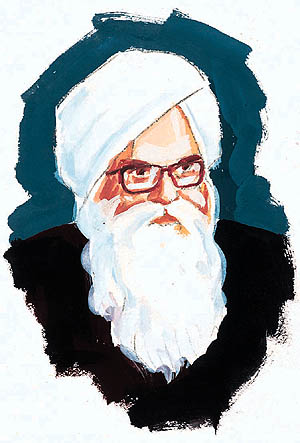 Bhai Vir Singh was born into a family of scholars, and he grew up in the holy city of Amritsar. He finished his Matriculation winning the district board's gold medal. When he was still at school, he was married to Bibi Chattar Kaur.
Bhai Vir Singh was born into a family of scholars, and he grew up in the holy city of Amritsar. He finished his Matriculation winning the district board's gold medal. When he was still at school, he was married to Bibi Chattar Kaur.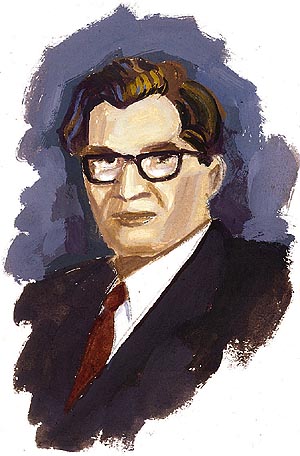 Inspired by the daredevilry of firebrand revolutionary V. D. Savarkar, he himself led a life as exciting as that of his childhood idol. Quite early in life, he read Bankim Chandra's Anand Math. The book had a profound impact on the young man. Roy studied for a while at National College, when Sri Aurobindo was Principal. He soon joined the Yugantar group - an organisation that believed in violent revolution. As he indulged in more and more revolutionary activities, he began to figure prominently in police records. When the situation became an impossible one for him, he was forced to flee the country.
Inspired by the daredevilry of firebrand revolutionary V. D. Savarkar, he himself led a life as exciting as that of his childhood idol. Quite early in life, he read Bankim Chandra's Anand Math. The book had a profound impact on the young man. Roy studied for a while at National College, when Sri Aurobindo was Principal. He soon joined the Yugantar group - an organisation that believed in violent revolution. As he indulged in more and more revolutionary activities, he began to figure prominently in police records. When the situation became an impossible one for him, he was forced to flee the country.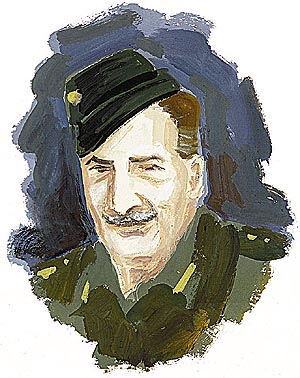 And yet this great soldier and officer who would finally become a Field Marshal many decades later, actually wanted to be a gynaecologist! He was born in Amritsar on April 3, 1914, and was the fifth child in a family of four brothers and two sisters. Endowed with a good sense of humour, this thin and wiry lad kept the family in splits with his jokes and mimicry. His father, Dr H. F. Manekshaw was a doctor, and Sam also wanted to be a doctor. But while he was at Hindu College, Amritsar, he saw an advertisement calling young men to enter the newly established Indian Military Academy in Dehra Dun. Sam gave it a shot, and he was selected.
And yet this great soldier and officer who would finally become a Field Marshal many decades later, actually wanted to be a gynaecologist! He was born in Amritsar on April 3, 1914, and was the fifth child in a family of four brothers and two sisters. Endowed with a good sense of humour, this thin and wiry lad kept the family in splits with his jokes and mimicry. His father, Dr H. F. Manekshaw was a doctor, and Sam also wanted to be a doctor. But while he was at Hindu College, Amritsar, he saw an advertisement calling young men to enter the newly established Indian Military Academy in Dehra Dun. Sam gave it a shot, and he was selected. 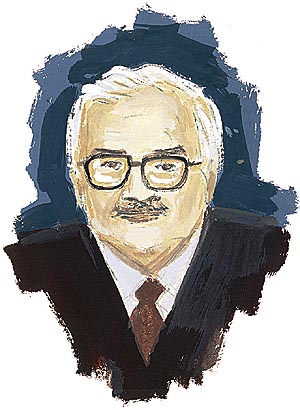 India's leading nuclear physicist, Prof Raja Ramanna was born into a distinguished family that had its connections with the Royal Court of the erstwhile Mysore State. B. Venkatachar, his grandfather's brother was a great Kannada novelist, who had also translated the novels of Bankim Chandra Chatterji into the Kannada. His father, B. Ramanna, was a judge in the Mysore state, and his mother Rukminiamma, was an exquisite lady, well versed in Indian classics as well as Shakespeare Dickens, and Walter Scott. When Dr Ramanna was born, they named him Bindignaville Krishnaraja Ramanna, but later they decided to shorten the tongue-twister to Raja Ramanna.
India's leading nuclear physicist, Prof Raja Ramanna was born into a distinguished family that had its connections with the Royal Court of the erstwhile Mysore State. B. Venkatachar, his grandfather's brother was a great Kannada novelist, who had also translated the novels of Bankim Chandra Chatterji into the Kannada. His father, B. Ramanna, was a judge in the Mysore state, and his mother Rukminiamma, was an exquisite lady, well versed in Indian classics as well as Shakespeare Dickens, and Walter Scott. When Dr Ramanna was born, they named him Bindignaville Krishnaraja Ramanna, but later they decided to shorten the tongue-twister to Raja Ramanna.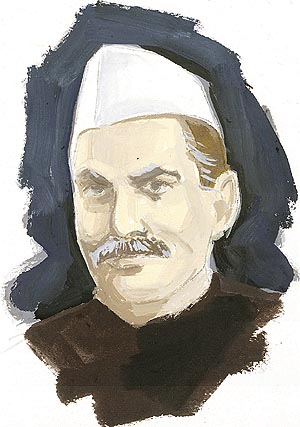 But Rajendra Prasad went much farther; not only did he become the President of the Congress Party in 1932, but he also went on to become the first President of independent India in 1950.
But Rajendra Prasad went much farther; not only did he become the President of the Congress Party in 1932, but he also went on to become the first President of independent India in 1950. Belonging to the Coorg district of Karnataka, a region that is particularly known for its natural beauty and for giving India a regular supply of excellent soldiers and army officers, Cariappa often heard stories of valour of World War I veterans of his region. It was not long before he started dreaming of becoming an officer himself. He soon won his Commission, and found himself at Daly Cadets College, Indore. It was there that he learnt the basics of military warfare, battle tactics, leadership techniques, and administrative skills. His officers were very happy the way this young man was shaping up, so they sent him to the prestigious Royal Military College, Sandhurst. He was made Second Lieutenant in 1919, and was posted first to the Second Battalion of the 2/88th Carnatic Infantry, and then to the 2/125th Napier's Rifles.
Belonging to the Coorg district of Karnataka, a region that is particularly known for its natural beauty and for giving India a regular supply of excellent soldiers and army officers, Cariappa often heard stories of valour of World War I veterans of his region. It was not long before he started dreaming of becoming an officer himself. He soon won his Commission, and found himself at Daly Cadets College, Indore. It was there that he learnt the basics of military warfare, battle tactics, leadership techniques, and administrative skills. His officers were very happy the way this young man was shaping up, so they sent him to the prestigious Royal Military College, Sandhurst. He was made Second Lieutenant in 1919, and was posted first to the Second Battalion of the 2/88th Carnatic Infantry, and then to the 2/125th Napier's Rifles. 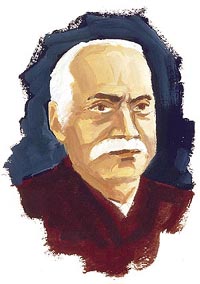 What voice is it that I hear
What voice is it that I hear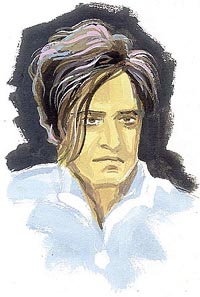 The little boy, Kundan Lal Saigal, would grow up to become one of the legends of Indian light classical music. But all his life he never forgot the lesson the Sufi had taught him, and that was about all the training he ever had in music. And yet when the Prayag Sangeet Samiti organised its annual music conference, it was Saigal that people wanted first of all on stage. In the presence of such masters as Pandit Onkar Nath Thakur, Ustad Faiyaz Khan, V. D. Paluskar, Narayan Rao Vyas, and Vinayak Rao Patwardhan, Saigal did not have the courage to walk up to the stage and perform. He was finally persuaded to sing, and he very reluctantly agreed to sing. He began with a few bhajans and ghazals followed by songs from Street Singer, Chandidas, Yahudi ki ladki and so on bringing the house down with a thunderous applause. After the show he approached Ustad Faiyaz Khan for blessings. " I have nothing I can teach you that you do not know," the Ustad said, "I have learnt a lot from you myself . . ."
The little boy, Kundan Lal Saigal, would grow up to become one of the legends of Indian light classical music. But all his life he never forgot the lesson the Sufi had taught him, and that was about all the training he ever had in music. And yet when the Prayag Sangeet Samiti organised its annual music conference, it was Saigal that people wanted first of all on stage. In the presence of such masters as Pandit Onkar Nath Thakur, Ustad Faiyaz Khan, V. D. Paluskar, Narayan Rao Vyas, and Vinayak Rao Patwardhan, Saigal did not have the courage to walk up to the stage and perform. He was finally persuaded to sing, and he very reluctantly agreed to sing. He began with a few bhajans and ghazals followed by songs from Street Singer, Chandidas, Yahudi ki ladki and so on bringing the house down with a thunderous applause. After the show he approached Ustad Faiyaz Khan for blessings. " I have nothing I can teach you that you do not know," the Ustad said, "I have learnt a lot from you myself . . ."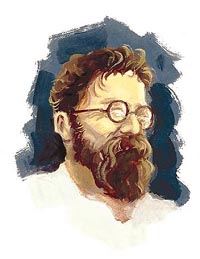 After the incident, as Vinoba was trying to figure out the future course of his life, he chanced upon to read an extract of a speech delivered by Gandhi. The experience changed his outlook on life forever. He wrote a letter to Gandhi, and was surprised when he got a prompt reply. He wrote once again, and the response was as usual immediate. This interesting correspondence carried on for a while, until the two men decided to meet in person. "Providence took me to Gandhi, and I found in him not only the peace of the Himalayas but also the burning fervour of revolution, for freedom. I said to myself that both of my desires had been fulfilled." Gandhi himself was so impressed with his new disciple that he asked him to take charge of the then newly established ashram at Wardha.
After the incident, as Vinoba was trying to figure out the future course of his life, he chanced upon to read an extract of a speech delivered by Gandhi. The experience changed his outlook on life forever. He wrote a letter to Gandhi, and was surprised when he got a prompt reply. He wrote once again, and the response was as usual immediate. This interesting correspondence carried on for a while, until the two men decided to meet in person. "Providence took me to Gandhi, and I found in him not only the peace of the Himalayas but also the burning fervour of revolution, for freedom. I said to myself that both of my desires had been fulfilled." Gandhi himself was so impressed with his new disciple that he asked him to take charge of the then newly established ashram at Wardha. 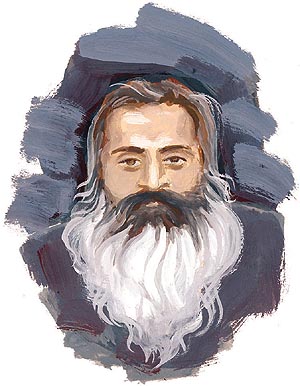 Born at Kurundwad state of Maharashtra into a Brahmin family, Vishnu Digambar Paluskar inherited musical gifts from his
Born at Kurundwad state of Maharashtra into a Brahmin family, Vishnu Digambar Paluskar inherited musical gifts from his  Thousands cheered the Indians that day, and among them was a person named Adolf Hitler. He was so impressed by Dhyan Chand's skill with the ball, that he is supposed to have told him: "I will make you Field Marshal if you join the German Army." Not the one to be swayed by praise, Dhyan Chand refused the offer politely.
Thousands cheered the Indians that day, and among them was a person named Adolf Hitler. He was so impressed by Dhyan Chand's skill with the ball, that he is supposed to have told him: "I will make you Field Marshal if you join the German Army." Not the one to be swayed by praise, Dhyan Chand refused the offer politely.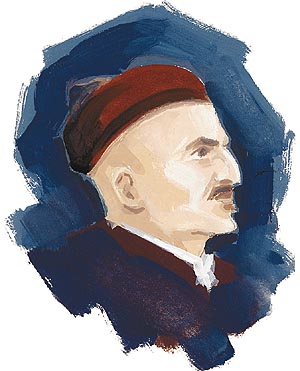 In his formative years Bhakhande was greatly inspired by Gyanotejak Mandali, the oldest music academy in India, founded by the Parsis in 1870. As he grew up and studied music deeply, he realised that India classical music had not only degenerated in the past centuries, and though it was of great merit, it was not systematised scientifically, thus leading to confusion and acrimony among its various practitioners. After careful thought he undertook the mammoth and spine-breaking task of codifying and writing Indian music. For the next twenty-five years of his life, he travelled all over India, met great masters, read whatever was available, and made exhaustive researches. He spent another 25 years studying contemporary and classical western music, modifying and adapting the Western notation system to suit Indian music.
In his formative years Bhakhande was greatly inspired by Gyanotejak Mandali, the oldest music academy in India, founded by the Parsis in 1870. As he grew up and studied music deeply, he realised that India classical music had not only degenerated in the past centuries, and though it was of great merit, it was not systematised scientifically, thus leading to confusion and acrimony among its various practitioners. After careful thought he undertook the mammoth and spine-breaking task of codifying and writing Indian music. For the next twenty-five years of his life, he travelled all over India, met great masters, read whatever was available, and made exhaustive researches. He spent another 25 years studying contemporary and classical western music, modifying and adapting the Western notation system to suit Indian music. 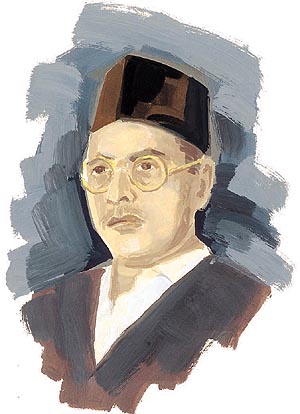 Though Madame Cama and the International Court of Justice took objected his illegal arrest on French soil, the ultimate decision was given in favour of England.
Though Madame Cama and the International Court of Justice took objected his illegal arrest on French soil, the ultimate decision was given in favour of England.